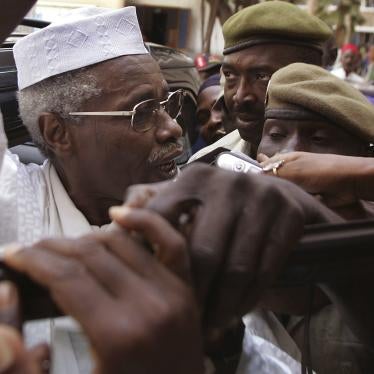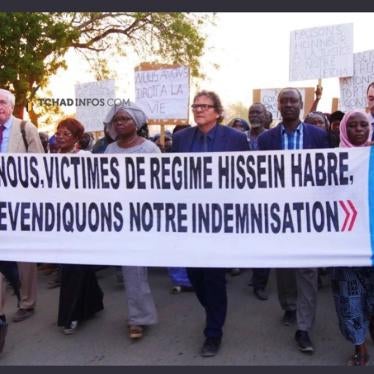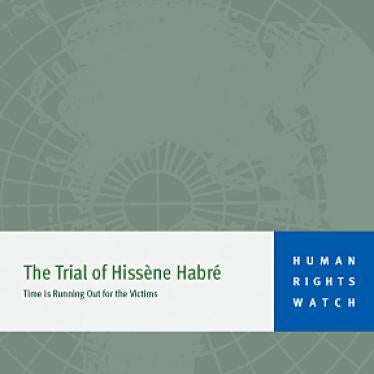One year after Senegal agreed to an African Union request that it prosecute Hissène Habré, it has not moved forward or even presented a plan for the investigation and trial of the former Chadian dictator, Chadian and Senegalese activists said today.
In January, President Abdoulaye Wade of Senegal called on the Senegalese judiciary to “meet the challenge” of Habré’s investigation and trial and “show the world the powerful force of Senegalese justice,” but that challenge has gone unmet and the case remains at a virtual standstill.
Habré, who lives in Senegal, is accused of thousands of political killings, systematic torture and waves of “ethnic cleansing” during his rule in Chad from 1982 to 1990. Habré was first arrested in Senegal in February 2000, but Senegal refused to prosecute him then or to extradite him to Belgium in 2005. In July 2006, Dakar agreed to an AU decision that Habré be put on trial in Senegal.
“We have been fighting for 17 years to bring Hissène Habré to justice, and time is running out. Unless Senegal takes action soon, there won’t be any victims left at the trial,” said Souleymane Guengueng, vice-president of the Chadian Association of Victims of Political Repression and Crime (AVCRP, or Association des victimes de crimes et répressions politiques), who spent three years in Habré’s jails. “Senegal has betrayed us twice, first by refusing to prosecute Habré in 2000, then by refusing to extradite him to Belgium. We are worried about another betrayal.”
“Senegal’s image and even its credibility in the international community have been damaged,” said Alioune Tine, of the Dakar-based African Assembly for the Defense of Human Rights (RADDHO). “There is very little political will to address this case, and the question of impunity more globally. How is Africa to avoid being the eternal subject of international justice if we cannot deliver justice ourselves? How can we avoid the extradition of Habré and other African leaders if Africa fails to act?”
Today in N’Djamena, the capital of Chad, victims and their supporters are marching to demand that Senegal make good on its promises.
Senegal has publicly complained that it has not received international assistance to prepare the case, but the groups said that many countries were ready to assist and that Senegal has not actually made any requests for funding.
The African Union, whose summit will be held in Accra on July 1-3, should assist Senegal and monitor its progress by naming a special envoy for the case, the groups said.
“The African Union has called on Senegal to prosecute Hissène Habré and a year later Senegal has very little to show,” said Jacqueline Moudeina of the Association tchadienne pour la promotion et la défense des droits de l’homme (ATPDH), who is also a lawyer for the victims. “It is the African Union’s responsibility to see that its decision is put into practice. The AU’s credibility, and that of all Africa, is at stake here.”
In May 2006, the UN Committee against Torture, in a case brought by Habré’s victims, ruled that Senegal had violated the UN Convention against Torture by failing to prosecute or extradite Habré, and called on the Senegalese government to do one or the other. One year later, that ruling, too remains unimplemented.







